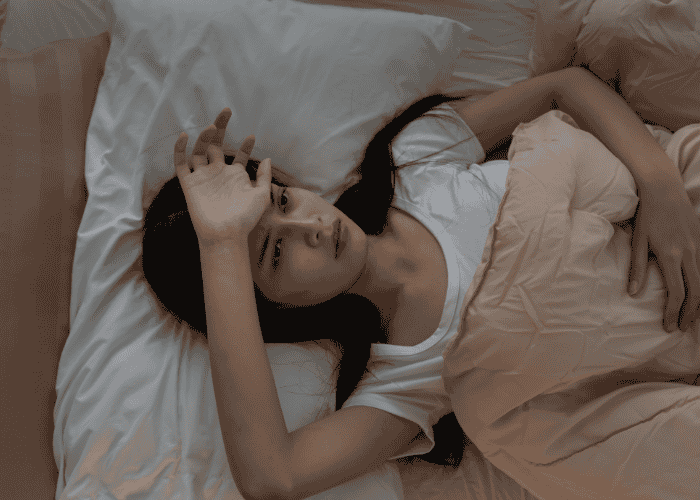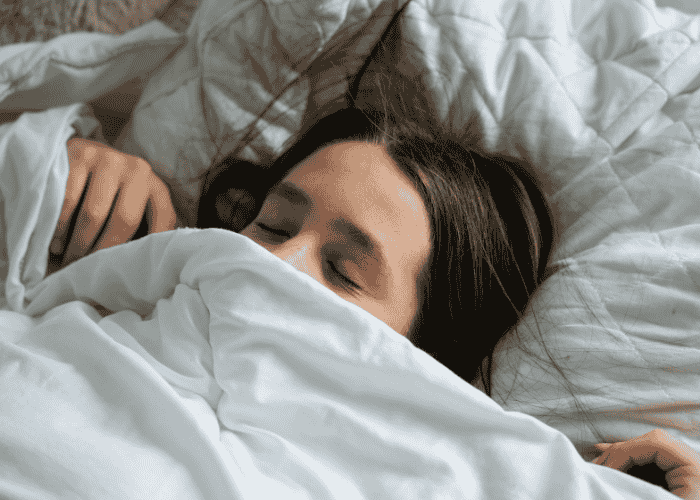Sleep Problems in Teens: Causes, Signs, and Solutions

In the past few years, sleep difficulties in teens have been identified as a public health issue. Teen sleep problems present themselves in different ways, including lack of sleep, trouble falling asleep, daytime drowsiness, and overall poor quality of sleep.1 Physical health concerns, mental health struggles, as well as neurodevelopmental issues all contribute to sleep disorders in teens.2
But why are so many teens struggling with sleep problems? And what can be done about it? In this article, we’ll explore:
What sleep problems in teens are- Signs and symptoms of sleep problems in adolescents
- Causes and risk factors of teenage sleep issues
- Treatment options, support strategies, and parental guidance for teen sleep

What Are Sleep Problems in Teens?
The 2021 Youth Risk Behavior Survey (YRBS) uncovered important insights about teen sleep issues. Two key takeaways are that:
Sleep issues tend to affect female teens more frequently than teen boys.- Between 2009 and 2021, the number of high school kids demonstrating sleep-related issues increased.3
Recognizing Sleep-Related Mental Health Symptoms
There are multiple sleep disorders that can affect teens. For example, delayed sleep phase syndrome, night terrors, sleep-onset anxiety, and even narcolepsy – a condition that can cause people to feel sleepy and fall asleep suddenly throughout the day. Considering the range of severity of these disorders, recognizing sleep-related mental health symptoms is crucial for parents today.4
Common symptoms of sleep disorders in teens include the following:
Difficulty falling asleep- Daytime sleepiness
- Waking up in the middle of the night
- Snoring or other disordered breathing during sleep
- Low energy after normal activities
- A significant shift in the normal delay in sleep onset (going to bed at 2am and waking up much later in the morning)
If you notice these signs and symptoms in your teenager, it’s important that you don’t ignore them. Specifically, recognizing sleep-related mental health problems and getting your teen help for sleep issues promptly is a top priority.
Risk Factors and Causes of Sleep Problems in Teens
Research can’t show us whether certain factors cause sleep problems in teens. However, it can tell us if something increases a teen’s risk of struggling with sleep. The evidence suggests that there are biological, physical, and psychological factors that can predispose teens to sleep problems.
Biological Factors
A teen’s natural body clock (known as their circadian rhythm) and sleep cycle change at this age. Research has shown that there is a biological delay in the timing of sleep onset during adolescence. This then leads to teens staying up later in the night, which often results in insufficient sleep.5
Physical Factors Affecting Sleep
Teens suffering from chronic pain are more likely to experience sleep issues than their peers. In fact, a study of 12 to 18-year-olds found that those with chronic pain were six times as likely to show symptoms of insomnia.6 In addition, certain medical conditions, medications, side effects, and hospital stays impact sleep in teenagers.
Psychological Risk Factors
There is a link between stress and sleep problems in teens. When the levels of stress get more severe, adolescents may develop anxiety disorders, which are known to negatively impact sleep.
Other mental health conditions, like depression and bipolar disorder, have been linked to sleep problems. However, it’s not clear whether these conditions cause sleep problems, just contribute to the problem, or the opposite – that sleep problems put children at greater risk of mental health conditions. For example, if your child is depressed, sleep issues may be the direct effect of the depression, whereas on the other side of things, teens who consistently struggle with a lack of sleep could be prone to developing depression.7
It is clear that the wide range of risk factors for sleep issues in teens can be difficult to combat. Luckily, there are a variety of proven interventions and therapies to treat sleep problems in teens.
Early Intervention for Sleep Issues: Treatment Options
If you notice that your teen is experiencing sleep issues, early intervention is key. There are many treatment options available to help.
Relaxation Techniques for Teens
Relaxation techniques for teens can be helpful for those troubled with anxiety and sleep. This includes mindfulness activities like guided meditations, progressive muscle relaxation, and paced breathing.
It’s important to bear in mind that we’re all unique, so different techniques work in varied ways for each of us. As such, it’s worth taking the time to find what works for you. If you don’t find a particular strategy helpful, try something new.
Medications for Teen Sleep Issues
Specific medications can also help with different types of insomnia. A few examples include trazodone, quetiapine, and zolpidem. You can read more about the different types of medications for sleep here.
Therapy for Sleep Problems in Teens
Of course, non-pharmacological interventions are also available, such as therapy for teen sleep issues. Cognitive Behavioral Therapy (CBT) has been shown to help teens overcome sleep issues.
Mission Prep provides options for CBT for teens, alongside other therapy options, both in an outpatient setting and in a more intensive residential facility setting.
Managing Anxiety-Related Sleep Problems at Home
If you’re looking for ways to help your teen improve their sleep, consider different coping strategies, such as:
- Turning off electronic devices before bed to decrease the negative impact of blue light, which can keep people awake
- Engaging in a brief mindfulness meditation to diffuse worries
- Getting regular exercise during the day to promote physical health
- Limiting caffeine later in the day, which can increase anxiety
- Taking part in a structured CBT program to cope with negative thoughts
- Taking appropriate medications or sleep aids as prescribed
- Open communication between you and your child about their anxiety and worries to let them know that someone is there to listen when times are hard
Managing anxiety-related sleep problems is difficult, but by implementing multiple coping strategies and determining the most effective treatment for your child, they can get the help they need to improve their sleep and overall wellness.
Parents’ Guide: Supporting Restful Sleep in Adolescents
Promoting healthy sleep hygiene- Implementing routines
- Encouraging a balanced life.8
By educating yourself on the factors that positively and negatively impact a teen’s sleep, you can help develop your teen’s resilience. This will make it easier for them to combat the physical, psychological, and biological factors predisposing them to sleep issues.
Promoting a regular nighttime routine, such as turning off electronics an hour before bedtime and avoiding caffeine later in the day, can also make a big difference.
What’s more, today’s teens are under a lot of pressure. Between school, extracurricular activities, social obligations, and family dynamics, it’s natural for your child to get overwhelmed, and this can have a real impact on sleep. It’s important to acknowledge that and encourage your child to have a good balance between their responsibilities and self-care.

Mission Prep: Treatment for Teen Sleep Problems
At Mission Prep, we offer a variety of resources for parents and caregivers to help support adolescent wellness and mental health, including sleep. Some of our mental health services include:
- CBT for teens
- Eye Movement Desensitization and Reprocessing (EMDR)
- Interpersonal Therapy
- Mindfulness-Based Therapy (MBT)
- Transcranial Magnetic Stimulation (TMS).
We understand that supporting restful sleep in adolescents requires an individualized approach, and treatment is not a one-size-fits-all solution.
If you’re concerned about your teen’s sleep, take the first step to getting them treatment by contacting us at Mission Prep today. Our team of trained professionals is here to answer any questions you have and explore all the options available to you and your teen.
References
- Saxvig, I. W., Bjorvatn, B., Hysing, M., Sivertsen, B., Gradisar, M., & Pallesen, S. (2020b). Sleep in older adolescents. Results from a large cross‐sectional, population‐based study. Journal of Sleep Research, 30(4). https://doi.org/10.1111/jsr.13263
- Delahoyde, M., Tyack, C., Kugarajah, S., & Joseph, D. (2024). Insomnia and other sleep disorders in adolescence. BMJ Paediatrics Open, 8(1), e001229. https://doi.org/10.1136/bmjpo-2021-001229
- CDC. (2024, June 14). 2021 Youth Risk Behavior Survey results. Youth Risk Behavior Surveillance System (YRBSS). https://www.cdc.gov/yrbs/results/2021-yrbs-results.html
- Bruce, E. S., Lunt, L., & McDonagh, J. E. (2017). Sleep in adolescents and young adults. Clinical Medicine, 17(5), 424–428. https://doi.org/10.7861/clinmedicine.17-5-424
- Crowley, S. J., Acebo, C., & Carskadon, M. A. (2007). Sleep, circadian rhythms, and delayed phase in adolescence. Sleep medicine, 8(6), 602–612. https://doi.org/10.1016/j.sleep.2006.12.002
- Palermo, T. M., Wilson, A. C., Lewandowski, A. S., Toliver-Sokol, M., & Murray, C. B. (2011). Behavioral and psychosocial factors associated with insomnia in adolescents with chronic pain. Pain, 152(1), 89–94. https://doi.org/10.1016/j.pain.2010.09.035
- Uccella, S., Cordani, R., Salfi, F., Gorgoni, M., Scarpelli, S., Gemignani, A., Geoffroy, P. A., De Gennaro, L., Palagini, L., Ferrara, M., & Nobili, L. (2023). Sleep deprivation and insomnia in Adolescence: Implications for Mental Health. Brain Sciences, 13(4), 569. https://doi.org/10.3390/brainsci13040569
- Jakobsson, M., Josefsson, K., & Högberg, K. (2022). Adolescents’ Suggestions on how to Support Their Sleep: A Focus Group Study. The Journal of School Nursing, 40(3), 275–284. https://doi.org/10.1177/10598405221084317













